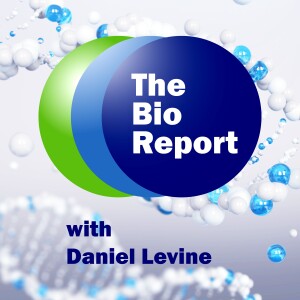Episodes

3 hours ago
3 hours ago
Craig Lipset, advisor and founder of Clinical Innovation Partners, sits down with Nagaraja Srivatsan to discuss how AI can bring greater predictability to clinical trials, how organizations can adopt the technology effectively, and the importance of having a culture of experimentation.

2 days ago
2 days ago
While AI has been seductive in its promise for revolutionizing drug development, one of the constraints remains the quality of the data that is used by any given platform. BPG Bio, an early innovator in the application of AI to drug development as Berg, is taking what it calls a “biology-first” approach. It capitalizes on its proprietary biobank to conduct multi-omics analysis to understand the biological mechanisms of diseases. We spoke to Niven Narain, CEO of BPGbio, about how the company’s platform technology uncovers novel targets, its evolution from its start as Berg, and how the platform continues to provide insight into experimental therapies after they advance to the clinic.

Wednesday Jul 02, 2025
The Search for Better Obesity Treatments
Wednesday Jul 02, 2025
Wednesday Jul 02, 2025
Despite the market success of GLP-1 agonists to treat obesity, many patients suffer side effects such as nausea, diarrhea, and vomiting. These medicines also cause significant loss of muscle mass. And when someone discontinues use, they often regain the weight they lost. Skye Bioscience is developing nimacimab, an experimental therapy that has the potential to induce weight loss by inhibiting the CB1 receptor. Because of its different target, it may be able to be used in conjunction with GLP-1 agonists and lower the dose of those drugs to make them more tolerable, or combined with other therapeutic approaches. We spoke to Punit Dhillon, president and CEO of Skye Bioscience, about CB1 as a target for treating obesity, its experimental therapy nimacimab, and the potential to combine it with GLP-1 agonists and other therapeutic approaches.

Wednesday Jun 25, 2025
A Novel Approach to Treating Chronic Low Back Pain
Wednesday Jun 25, 2025
Wednesday Jun 25, 2025
Many companies are seeking to develop non-opioid treatments for pain, but Persica Pharmaceuticals may be taking a surprising approach for chronic low-back pain. The company’s lead experimental therapy for the condition is an antibiotic. That may sound odd, but it turns out that about half of chronic low back pain cases are due to bacterial infections that occur after herniation of the spinal disc or injury. We spoke to Steve Ruston, CEO of Persica Pharmaceuticals, about the need for new approaches to chronic low back pain, the company’s experimental targeted intradiscal antibiotic injections, and the need to educate physicians about the role infection can play in the condition.

Wednesday Jun 18, 2025
A Biologic Designed to Treat Acute Exacerbations of Asthma and COPD
Wednesday Jun 18, 2025
Wednesday Jun 18, 2025
Though there are plenty of therapeutic alternatives for asthma and chronic obstructive pulmonary disease, or COPD, there are no approved biologics for treating acute exacerbations of these conditions. Connect Biopharma believes that’s an opportunity. It's experimental therapy rademikibart has shown promise treating exacerbations and providing sustained improvements. We spoke to Barry Quart, CEO of Connect Biopharma, about the unmet need the company is seeking to address, how rademikibart works, and Connect’s repositioning as a U.S.-centric company.

Wednesday Jun 11, 2025
Turbocharging Drug Discovery with Health Data
Wednesday Jun 11, 2025
Wednesday Jun 11, 2025
When Vanderbilt University Medical Center began to consider how big data and precision medicine were going to impact both research and development and clinical care, it struck on the idea of building a large-scale biobank and tying it to its store of millions of electronic health records. That ultimately led to the founding of Nashville Bioscience, a for-profit subsidiary of the medical center. We spoke to Leeland Ekstrom, co-founder and CEO of NashBio, about the company’s data collection methods, the significance of the alliance it's developed with leading biopharmaceutical companies, and how it's enabling a transformation of drug development with data.

Wednesday Jun 04, 2025
Revolutionizing the Production of Biologics with Algae
Wednesday Jun 04, 2025
Wednesday Jun 04, 2025
Spirulina, also known as blue-green algae, is edible. It can be engineered to cost-effectively produce biologics that can be taken orally. Though people have long sought to do this, Lumen Bioscience has developed platform technology that solved the various challenges is engineering spirulina to produce medicines. We spoke to Brian Finrow, co-founder and CEO of Lumen, about the company’s platform technology, why it makes possible the pursuit of biologics for indications that were previously not practical, and the potential to make these advanced therapies affordable and accessible in parts of the world where people may not have widely enjoyed their benefits.

Wednesday May 28, 2025
Making Medicines for a World of People with Cancer
Wednesday May 28, 2025
Wednesday May 28, 2025
Cancer is a global disease, and BeOne Medicines believes it should develop its cancer therapies for global markets. To do so, it’s taking innovative approaches to clinical trials, pricing, and manufacturing to enable it to support patients not only in high-income countries but also in low- and middle-income countries. We spoke to Matt Shaulis, general manager of North America for BeOne Medicines, about the significant global disparities in cancer care, the mission of BeOne Medicines to improve access and affordability to therapies, and the opportunities and challenges of taking a global approach to marketing innovative medicines.

Daniel Levine
Daniel Levine is an award-winning business journalist who has reported on the life sciences, economic development, and business policy issues throughout his career. He is founder and principal of Levine Media Group, host of The Bio Report and RARECast podcasts, a senior fellow at the Center for Medicine in the Public Interest, and author of Global Genes’ annual NEXT report on emerging trends in the world of rare disease. From 2011 to 2014, he served as the lead editor and writer of Burrill & Company’s acclaimed annual book on the biotech industry. His work has appeared in numerous national publications including The New York Times, The Industry Standard, and TheStreet.com.

